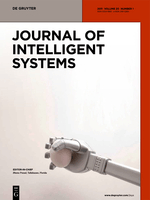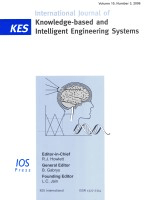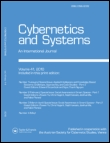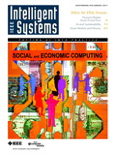
Journal of Intelligent Systems
Scope & Guideline
Connecting Ideas, Inspiring Intelligent Solutions
Introduction
Aims and Scopes
- Artificial Intelligence and Machine Learning:
The journal emphasizes research in artificial intelligence and machine learning, including algorithm development, applications, and theoretical advancements. This includes supervised, unsupervised, and reinforcement learning techniques. - Intelligent Systems Applications:
Research that applies intelligent systems to real-world problems, such as healthcare, industrial automation, smart cities, and environmental monitoring, is a core focus. The journal seeks to bridge the gap between theory and practical applications. - Data Analytics and Knowledge Discovery:
The journal covers methodologies for data analysis, including data mining, big data analytics, and knowledge discovery, highlighting the role of intelligent systems in extracting valuable insights from complex datasets. - Optimization and Decision-Making:
A significant area of research involves optimization techniques and decision-making processes, particularly in complex systems, where intelligent algorithms are utilized to enhance performance and efficiency. - Human-Machine Interaction:
Research on human-computer interaction, including emotion recognition, user experience, and intelligent dialogue systems, is also a key focus, reflecting the journal's commitment to improving user engagement with intelligent systems. - Modeling and Simulation of Intelligent Systems:
The journal includes studies on modeling and simulation techniques that help in understanding and predicting the behavior of intelligent systems under various conditions.
Trending and Emerging
- Explainable AI (XAI):
There is a growing emphasis on explainable AI, as researchers seek to improve transparency and interpretability of intelligent systems, addressing public and regulatory concerns about AI decision-making. - Federated Learning and Privacy-Preserving Techniques:
With increasing concerns over data privacy, research on federated learning and privacy-preserving methods is gaining traction, allowing for collaborative learning while safeguarding sensitive information. - AI in Healthcare:
Research focused on the application of AI in healthcare is trending, particularly in diagnostics, treatment planning, and personalized medicine, driven by the need for improved patient outcomes and healthcare efficiency. - Smart Cities and IoT Integration:
The integration of intelligent systems in smart city applications and IoT ecosystems is emerging as a key area of research, focusing on enhancing urban living through intelligent monitoring and resource management. - Sustainability and Green Technologies:
Emerging themes also include sustainability and the application of intelligent systems in environmental monitoring, resource conservation, and energy efficiency, reflecting a growing societal focus on sustainable practices. - Multi-Modal Learning:
Research on multi-modal learning, which combines various data types (e.g., text, images, audio) in intelligent systems, is becoming increasingly relevant as systems require more holistic understanding and processing capabilities.
Declining or Waning
- Traditional Rule-Based Systems:
Research on traditional rule-based systems is decreasing as more researchers shift towards data-driven and learning-based approaches to model intelligent systems, recognizing the limitations of purely rule-based methodologies. - Basic Theoretical Foundations:
There is a noticeable decline in purely theoretical papers that do not connect with practical applications. Researchers are increasingly expected to demonstrate the applicability of their theoretical findings in real-world scenarios. - Simplicity in Algorithm Design:
Research focusing on simplistic algorithms is waning as the field moves towards more complex, hybrid approaches that incorporate multiple methodologies and frameworks to address intricate problems. - Standalone Systems without Integration:
There is a diminishing interest in studies that propose standalone intelligent systems without considering integration with other systems or technologies, as interdisciplinary approaches are becoming more valued.
Similar Journals

JOURNAL OF INTELLIGENT INFORMATION SYSTEMS
Pioneering Research in AI and Information SystemsThe Journal of Intelligent Information Systems, published by Springer since 1992, is a premier academic journal that offers a multidisciplinary platform in the fields of Artificial Intelligence, Computer Networks and Communications, Hardware and Architecture, Information Systems, and Software. With an impressive impact reflected in its 2023 Q2 category rankings across multiple domains and a commendable standing in the Scopus Rankings—ranking #84 in Computer Networks and Communications and #101 in Artificial Intelligence—the journal is recognized for its contribution to advancing knowledge and innovation. Although it is not an open-access journal, its accessibility through institutional subscriptions ensures that a wide range of researchers, professionals, and students can engage with high-quality, peer-reviewed research that addresses the latest advancements and trends in intelligent systems. For over three decades, this journal has effectively bridged gaps between academia and industry, making it a vital resource for those aiming to push boundaries in intelligent information systems.

Intelligent Data Analysis
Catalyzing Innovation in the Realm of Data IntelligenceIntelligent Data Analysis is a highly regarded journal published by IOS Press, specializing in the fields of Artificial Intelligence, Computer Vision, and Pattern Recognition. With its ISSN 1088-467X and E-ISSN 1571-4128, the journal has been a cornerstone of scholarly communication since its inception in 1997, serving as a vital resource for researchers, professionals, and students engaged in advancing methodologies and applications in intelligent data analysis. The journal maintains its significance with impressive Scopus ranks, indicating its notable position within the academic community. Although currently not an Open Access journal, Intelligent Data Analysis offers a wealth of insights and findings, encouraging collaboration and knowledge exchange among its readership. With an impact factor reflective of its rigorous selection processes, the journal traverses a broad range of topics, contributing to ongoing discussions and innovations in its field. As the journal looks toward shaping future research until 2024 and beyond, it remains a pivotal platform for disseminating cutting-edge research and fostering academic inquiry.

INTEGRATED COMPUTER-AIDED ENGINEERING
Bridging Theory and Application in Engineering ExcellenceINTEGRATED COMPUTER-AIDED ENGINEERING (ISSN: 1069-2509, E-ISSN: 1875-8835) is a prominent journal published by IOS PRESS in the Netherlands, renowned for its rigorous coverage of the interdisciplinary fields of artificial intelligence, computational theory, and software applications. Since its inception in 1993, this journal has consistently contributed to the academic discourse, standing out in the Q1 and Q2 quartiles across various categories as of 2023. With Scopus rankings placing it in the93rd percentile for computational theory and mathematics and 91st for theoretical computer science, it is a vital resource for researchers and professionals seeking to explore innovative methodologies and advanced engineering solutions. While not an open-access journal, INTEGRATED COMPUTER-AIDED ENGINEERING provides comprehensive access options for institutional subscribers, ensuring the dissemination of vital research findings to a global audience. This journal aims to facilitate the exchange of knowledge, inspire future studies, and foster technological advancements in computer-aided engineering.

KNOWLEDGE AND INFORMATION SYSTEMS
Advancing the Frontiers of Information ScienceKNOWLEDGE AND INFORMATION SYSTEMS, published by SPRINGER LONDON LTD, is a distinguished journal in the field of information systems, artificial intelligence, and human-computer interaction. With its ISSN 0219-1377 and E-ISSN 0219-3116, this journal has built a robust reputation since its inception, featuring a convergence of valuable research from 2005 through 2024. Catering to a diverse academic audience, it is classified among the leading journals in its category, proudly holding a Q1 ranking in Information Systems and Q2 rankings in multiple other domains. The journal aims to publish cutting-edge research that not only advances theoretical understanding but also provides practical applications within these rapidly evolving fields. Although it is not an Open Access journal, subscribers can access a wealth of knowledge critical for researchers, practitioners, and students looking to enhance their expertise. With a 2023 Scopus rank placing it within the 66th percentile for Information Systems, KNOWLEDGE AND INFORMATION SYSTEMS is an invaluable resource for those committed to pushing the frontiers of knowledge in technology and information science.

Applied Computing and Informatics
Pioneering Research for a Digital FutureApplied Computing and Informatics, published by Emerald Group Publishing Ltd, is a prominent open-access journal that has been serving the academic community since 2011. With a focus on advancing the fields of Computer Science Applications, Information Systems, and Software, this journal has established itself as a noteworthy publication, currently ranking in the Q3 quartile for each of its categories in 2023. The journal is particularly recognized for its commitment to disseminating high-quality research, as evidenced by its impressive Scopus rankings—placing it in the 92nd percentile for Computer Science Applications and the 91st percentile for both Information Systems and Software. Based in Saudi Arabia, it adopts a global perspective, inviting contributions from researchers worldwide. With its open-access policy, Applied Computing and Informatics ensures that cutting-edge research is accessible to a broad audience, fostering collaboration and innovation within the computing and informatics disciplines. This journal is an essential resource for academics, professionals, and students seeking to keep abreast of the latest trends and developments in their field.

International Journal of Knowledge-Based and Intelligent Engineering Systems
Advancing the Frontier of Intelligent Engineering SystemsThe International Journal of Knowledge-Based and Intelligent Engineering Systems, published by IOS PRESS, serves as a vital platform for scholars and practitioners involved in the fields of Artificial Intelligence, Control and Systems Engineering, and Software Development. Founded in 2004 and continuously publishing through to 2024, this journal stands out with its comprehensive coverage of innovative methodologies and applications that leverage knowledge-based systems. Although currently listed in Q4 for Artificial Intelligence and Q3 for Control and Systems Engineering, it features an increasing trajectory in the scientific community, as indicated by its rankings in Scopus—which reflects the growing importance of intelligent engineering systems in contemporary research. With a commitment to disseminating cutting-edge research without open access constraints, this journal is essential for those seeking to understand and contribute to advancements in intelligent systems. Join a global community of researchers and industry leaders by engaging with the latest findings shared in this well-regarded journal.

PeerJ Computer Science
Elevating Computer Science Through Open ScholarshipPeerJ Computer Science is a leading open access journal published by PEERJ INC, dedicated to the field of computer science. Since its inception in 2015, it has made significant strides in promoting scholarly communication and accessibility to cutting-edge research. With an impressive impact factor reflected by a Q1 ranking in the Computer Science (miscellaneous) category and a Scopus rank of 51 out of 232, this journal stands at the forefront of its field. The journal's open access model ensures that groundbreaking findings are readily available to researchers, professionals, and students alike, fostering collaboration and innovation in the ever-evolving landscape of computer science. As it continues to publish until 2024 and beyond, PeerJ Computer Science remains an essential resource for those seeking to stay ahead in their research and practice.

CYBERNETICS AND SYSTEMS
Exploring the Frontiers of Cybernetics and SystemsCYBERNETICS AND SYSTEMS, published by Taylor & Francis Inc, is a pivotal journal in the fields of Artificial Intelligence, Information Systems, and Software, with its publication spanning from 1980 to 2024. Holding an ISSN of 0196-9722 and an E-ISSN of 1087-6553, this journal is recognized for its impactful contributions, ranked in Q3 across its categories according to the latest metrics. With Scopus rankings placing it at the 57th percentile for Information Systems and maintaining substantial presence in Software and Artificial Intelligence fields, CYBERNETICS AND SYSTEMS serves as an essential platform for disseminating cutting-edge research. The journal aims to publish original research, theoretical frameworks, and innovative applications that advance the understanding of system processes and cybernetic interactions, making it an invaluable resource for researchers, professionals, and students seeking to remain at the forefront of these rapidly evolving disciplines.

IEEE INTELLIGENT SYSTEMS
Advancing Knowledge in Intelligent SystemsIEEE Intelligent Systems, published by the renowned IEEE Computer Society, stands at the forefront of research in the fields of Artificial Intelligence and Computer Networks and Communications. With an impressive Q1 ranking in both categories as of 2023 and Scopus rankings placing it in the top 5% of its field, this journal not only showcases cutting-edge scientific advancements but also serves as a vital resource for practitioners, academics, and students seeking to deepen their understanding and application of intelligent systems. The journal covers a broad range of topics including machine learning, data mining, and system architectures, reflecting its commitment to addressing contemporary challenges and innovations in technology. Although it does not offer open access, the journal's research contributions are invaluable, ensuring that its readership remains engaged with the latest findings and applications in a rapidly evolving field. For those interested in submitting high-quality research or staying updated on the latest developments, IEEE Intelligent Systems represents an essential hub of knowledge.

Intelligent Decision Technologies-Netherlands
Pioneering Research at the Intersection of Technology and Decision Making.Intelligent Decision Technologies-Netherlands, published by IOS PRESS, is an emerging journal dedicated to the dynamic fields of Artificial Intelligence, Computer Vision, and Human-Computer Interaction. Established in 2007 and continuing through 2024, this journal aims to foster interdisciplinary research and innovation by providing a platform for cutting-edge studies and applications of intelligent systems. While its current impact factor reflects a growing influence within the scientific community, with quartile rankings ranging from Q3 to Q4 in various pertinent disciplines, Intelligent Decision Technologies plays a pivotal role in shaping future research directions. Although the journal does not offer open access, it remains accessible across academic institutions, encouraging researchers, professionals, and students to contribute to and engage with the latest advancements in decision technologies. With a commitment to quality and relevance, this journal seeks to advance knowledge and enhance the understanding of intelligent systems in today's rapidly evolving technological landscape.